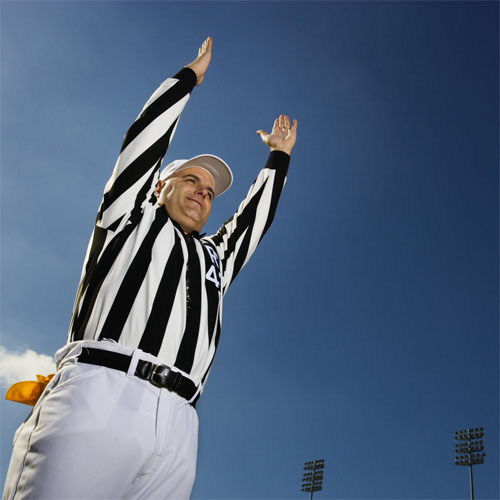
Zebra
Somewhere in, NJ
Male, 62
I've officiated football for over 30 years, now in my 26th on the college level. I've worked NCAA playoffs at the Division II and III level. In addition, I've coached at the scholastic level and have been an educator for over 35 years. I have no interest whatsoever in being an NFL official! Ever!
Well, you're asking me to explain the NFL's catch rule which is inexplicable. I saw it, got excited because i root for anyone playing the Pats, then realized that it was being reviewed. Meaning logic went out the window. James was not a runner. He was a pass receiver who had not yet become a runner. With me still? As a result, he had to "survive tbe ground", even though the NFL's Al Riveron actually said in his explanation that Ben completed a pass to James. Had James been a runner, then breaking the plane scores the TD, as you state. But he was not a runner, he was still a receiver. Still with me now? Had he pulled the ball in to his body, he probably catches it and the Steelers set up for the next play on the 1 1/2. Had gecstill been in college, it's likely a catch, too. Or as Tony Dungy said, anywhere but the NFL, that's a touchdown.
The rule doesn't change. Forward progress is....well, forward progress. If the QB pulls out from under center and gets stepped on and falls, the ball is marked where progress ended. Now, since he "retreated" from the center and went down, that's where he's down. It's like when a receiver catches a ball in advance of the line to gain but circles back hoping to get a lane to run in. If he is tackled behind where he caught the ball, that is where it's marked. He had progress but he gave it up of his own accord; he went back on his own.
Didn't see this nor hear anything about it. You're saying it was "clearly back"; maybe not.
I saw the play, heard Pereira. Wasn't quite sure what he meant. It can't be forward progress - which I think was still short - because Jordan on his own went backwards. Had he been hit and pushed back by the defender, then you have forward progress,
School Bus Driver
 Do the kids treat you with the same amount of respect as other authority figures at school?
Do the kids treat you with the same amount of respect as other authority figures at school?
Private Detective
Hospice Nurse
 Ever heard any crazy deathbed confessions or family secrets revealed?
Ever heard any crazy deathbed confessions or family secrets revealed?
That's a good question. Simply put, the tackler is responsible - period. And don't assume any whistle; as is often said, the play kills itself, not the whistle. For example, if a player is down and there's no immediate whistle, and the player gets hit, it's a foul, whistle or not.
Back to out of bounds: in your example A, you can envision the tackler right there as the runner hits OOB. You probably don't flag that because it's happening so quickly at the sideline. In B, you have a foul; that's pretty obvious. Cases in between? There really isn't an in-between. If the runner steps out, he's out and can't be hit. If the contact begins while the runner is in bounds, then it's not a foul unless there is unnecessary continuing contact out of bounds.
What you describe is certainly not a "tackle". Wgat you describe is unnecessary. That's a foul.
No. If you accept the DH, then you go from the enforcement spot (previous spot ), Mark off 10vyards, repeat down.
-OR-
 Login with Facebook
Login with Facebook (max 20 characters - letters, numbers, and underscores only. Note that your username is private, and you have the option to choose an alias when asking questions or hosting a Q&A.)
(A valid e-mail address is required. Your e-mail will not be shared with anyone.)
(min 5 characters)
By checking this box, you acknowledge that you have read and agree to Jobstr.com’s Terms and Privacy Policy.
-OR-
 Register with Facebook
Register with Facebook(Don't worry: you'll be able to choose an alias when asking questions or hosting a Q&A.)